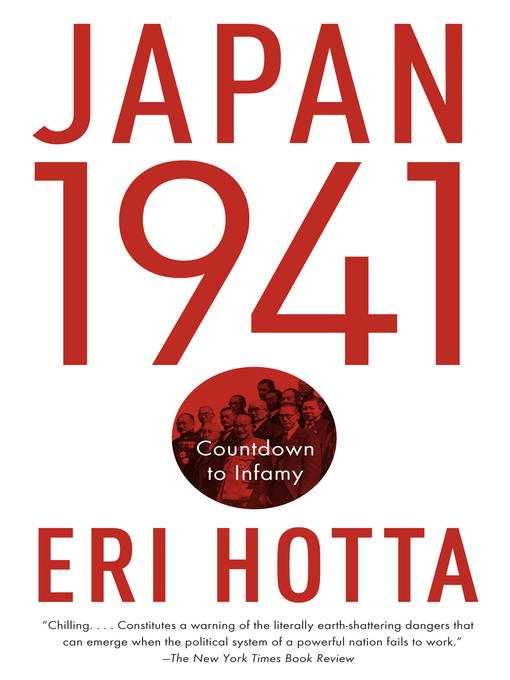
Japan 1941
Countdown to Infamy
کتاب های مرتبط
- اطلاعات
- نقد و بررسی
- دیدگاه کاربران
نقد و بررسی

Starred review from October 1, 2013
An Asian specialist examines the reasons behind the riskiest military venture in Japan's history. Why did Japan attack Pearl Harbor and begin a war it had virtually no chance of winning? In this focused, informed and persuasive book, Hotta (Pan-Asianism and Japan's War, 1931-45, 2007) explains the cultural forces at work and the political, economic, diplomatic and military issues that occupied the government in the years, and especially the months, preceding December 7, 1941. Without in any way excusing or justifying the officials who made the momentous decision to begin an entirely "preventable and unwinnable" war, she sympathetically tells the story of leaders maneuvered into a strategic box, albeit one largely of their own making, from which war appeared the only escape. Among Hotta's many sensitive portraits: the young Emperor Hirohito; Prime Minister Tojo (not the bloodthirsty dictator of American propaganda) and the fatally indecisive Prince Konoe who preceded him; Adm. Yamamoto, architect of the Pearl Harbor attack; Matsuoka, the longtime foreign minister; and Nomura, ambassador to the United States. Lending depth to her narrative, the author includes sketches of lesser figures like the novelist Kafu, author of an incisive diary about public events, and the brilliant and eccentric Kuroshima, Yamamoto's premier strategist. Already weary from a long war with China, with rice rationed and the public kept largely clueless about the government's machinations, the nation's leaders paused. Nevertheless, with the cultural imperative of consensus masking intraservice rivalries and deep divisions among the military and political classes, with the racism and imperialism of Western powers painfully rankling, with the desire for national greatness fueling a reckless expansionism, Japan gambled on a war where success depended almost entirely on forces outside its control. The impressively credentialed Hotta effortlessly returns us to the moment just before the dice were so disastrously rolled. From a perspective little known to Americans, a masterful account of how and why World War II began.
COPYRIGHT(2013) Kirkus Reviews, ALL RIGHTS RESERVED.

Starred review from October 15, 2013
In 1941, Japan was a resource-strapped country bogged down in a costly war with China. So why did it decide to initiate a war with the United States? Hotta (Pan-Asianism and Japan's War, 1931-45) explores every aspect of this question. She reveals that many high-ranking Japanese officials had real doubts about launching an attack on America. However, a combination of weak civilian leadership, outsize military involvement in government, extreme nationalism, and bureaucratic inertia forced Japan down a path of certain destruction. Her book gives colorful descriptions of the various characters involved, from the common Japanese soldier on the frontlines all the way up to the emperor himself. VERDICT This is a fascinating read for anyone interested in Japan's involvement in World War II generally or its motivations for attacking the United States specifically. While scholarly and thoroughly researched, it's also a highly enjoyable read. Hotta writes the story with a novel's narrative drive, making it a real page-turner. Readers seeking a more concise exploration of this topic should consider Jeffrey Record's A War It Was Always Going To Lose: Why Japan Attacked America in 1941.--Joshua Wallace, South Texas Coll. Lib., McAllen
Copyright 2013 Library Journal, LLC Used with permission.

September 15, 2013
This is an interesting, sometimes admirable, but frustratingly flawed effort to examine the lead up to the attack on Pearl Harbor from a Japanese perspective. Hotta, born in Tokyo and educated in Japan and the U.S., portrays the dilemma faced by the Japanese government and military in 1941. The war with China had no end in sight and drained Japan of men and limited resources. The political class was divided over the wisdom of territorial expansion, and even the military had its share of doubters, including some who feared the Soviet Union more than the U.S. Even among the military hawks there was concern that war with the U.S. was doomed to fail. Unfortunately, Hotta comes close to blaming the victim when she indicts American policy makers for their failure to understand Japan's views. For example, she condemns U.S. demands that Japan withdraw from China as high-handed, as if Japan's wanton, savage behavior there was acceptable. This is a useful look at the other side of the story, but the fact remains that Japan bears the full responsibility for launching a self-destructive war.(Reprinted with permission of Booklist, copyright 2013, American Library Association.)

























دیدگاه کاربران